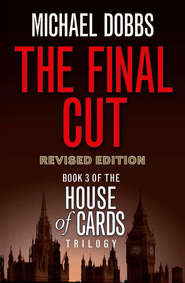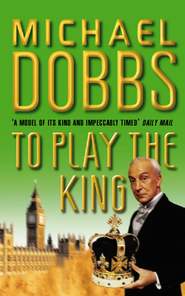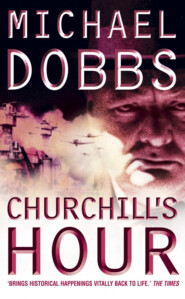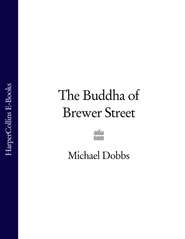По всем вопросам обращайтесь на: info@litportal.ru
(©) 2003-2025.
✖
Whispers of Betrayal
Автор
Год написания книги
2018
Настройки чтения
Размер шрифта
Высота строк
Поля
Goodfellowe understood some of this, although he had never been allowed to penetrate behind all the layers of tinsel. It meant that his love for her could never be a comfortable matter but, hell, he’d had years of respectable marriage, done the comfort thing and collected the T-shirts, all of which were starched and ironed and filled the locked matrimonial closet. He needed something different, not order and contentment but a challenge that would strip away the restraints and leave the T-shirts crumpled and torn, something that would allow the man beneath to show through.
As he listened to her words about Ministerial office and advancement, an uneasy sensation scoured his stomach. At first he hoped it might be nothing more than the echo of an unfinished breakfast, but quickly it overwhelmed him. A sensation he hadn’t felt in so very long.
Excitement.
Twisting inside him once more.
He had Elizabeth. And now, with her encouragement, once again he had that other inspiration missing from his life.
He had ambition.
The hour is late, well beyond evening. A solitary shaft of light cuts across the prep school lawn. The turf is immaculate, which is much more than can be said for Boris, the caretaker’s cat, a ginger-walnut tom with missing ear and the look of battles past, many of which he appears to have lost. He pauses, cautious, sniffing the air in suspicion before padding across the river of light.
The old clock above the quad takes its time about striking ten, disturbing the screech owl that had found a perch on the weather vane. There is no disguising the fact that the bell is badly cracked, and getting worse. The entire clock tower is a disgrace, so dilapidated it will soon need replacing if Amadeus can find the money, or silencing if not. Another tedious battle which as bursar he will have to fight with the governors, hand to hand, a tussle that will soak up as much of his energy as did the recapture of ‘Full Back’ on Mount Longdon, and maybe leave as many scars.
He turns up the volume of his CD player until the voices make his office vibrate. Not a problem, since there is no one left to disturb, apart from the cat and the owls. Mozart’s Requiem. The work of a dying man that was destined to be left behind, uncompleted. Amadeus has revisited this music many times recently, feeling its power, beginning to understand how wrathful the composer must have felt in his frustration, and sensing his fear. So much unfinished business.
‘… fac benigne ne perenni cremer igne,’ the chorus sang. ‘Grant that I burn not in everlasting fire.’
How Amadeus loathes his job. A travesty of his talents. Surrounded by children who have no respect and teaching staff who show no interest, parading in their crumpled jackets and tatty liberalism. When he was interviewed for the post, the headmaster suggested he had no management experience. Sure, he didn’t know how many paper clips he had in his desk drawer. But he had planned a Para battle group assault with eight hundred men and heavy drop kit, all loaded onto twenty Hercules that were then flown five hundred miles and dropped on precisely the right bloody spot at exactly the right bloody time so that no one drowned or broke his fucking back. That wasn’t management, of course, not in Civvy Street. He’d just have to get used to such subtle distinctions. ‘Look, it’s an income,’ the Officers Association had encouraged when they pushed the bursar’s position at him. Yeah, but so was mugging grandmothers.
He took the job because there was nothing else on offer at the time, apart from the still greater humiliation of his wife’s incessant nagging. And when he sat down and considered all the options, beneath all the doubts there was the bedrock of his pride. Amazing what a man’s pride could make him do.
Amadeus turns from his post at the window and wanders back to his desk, a route he has crossed and recrossed at least a dozen times during the evening, restless, like a refugee. From beneath the puddle of light thrown by the solitary lamp upon his desk he retrieves the copy of the Telegraph, tightly folded to the letter page, which contains the reply that has been printed to his own. It comes from the Minister for Defence, Gerald Earwick. He reads it again, and still his soul burns.
‘… distortion of the truth … time for the country to decide, arms or Accident & Emergency wards … our duty to defend our hospitals and schools, our old and infirm … an end to feather-bedding in the armed forces.’
On that night in the black snow on Mount Longdon, he had watched the youthful Argentinian conscript die, Scully’s bayonet stuck in an inch below his twelfth rib, the young man scrabbling uncomprehending at his emptying stomach while hope drained away between his fingers. Somehow it hadn’t seemed like a feather bed.
‘We should not allow the argument to be distorted,’ Earwick’s riposte continues, ‘by the self-interested pleading of a small number of disgruntled former officers. The truth of the matter is simple. The nation’s security remains safe in this Government’s hands.’
He reads it yet again, even though every word has already dripped like acid across his heart. The music of the Day of Judgement echoes in his head.
‘Dies irae, dies illa, solvet saeclum in favilla … Nil inultum remanebit,’ they chant. ‘O, day of wrath, that day will dissolve the earth in ashes … Nothing will remain unavenged!’
Nothing will remain unavenged. Eternal words that reach out across the ages. At last Amadeus stops his pacing. He pours himself a large whisky, a Talisker, neat, the colour of amber, sits at his desk and lights a cigarette. He drinks and inhales, both deeply. His mind reaches out to places far away but not so long ago. The slopes of Longdon with its stench of rotting fish. The drive through Sniper’s Alley in Mostar, and the ridge above Konjic where death jumped out of the virgin snow. Kigali, with its piles of bodies strewn like yesterday’s newspapers along the fetid roads, bloating in the sun. Places, and times, when he had been needed.
The music has stopped. The only sound in the room is that of his breathing, which is deep, as though he has been running, or is about to start. Perhaps he should put it all behind him, bury his anger and wait for salvation in the life hereafter. But he can’t. Forgiving the enemy is for saints, or politicians, or oil companies. Not for him. For Amadeus, every dark corner hides an injustice, every breath grows into a sigh of protest.
And while he breathes, he will not let it go.
He sucks at his cigarette until it glows brightly, like a star shell hanging in the sky, illuminating the field of battle. Then one more drag before he grinds it out. He uses Earwick’s reply as an ashtray.
As the paper curls in protest and the acrid smell of burning stings his nostrils, Amadeus makes three vows. He is not a man who takes vows lightly.
The first is that this cigarette will be the last he ever smokes.
The second vow, more difficult, is that he will drink less. Pity, but this will be the last bottle of whisky. From this point, only an occasional glass of wine or beer.
The third, however, gives him great pleasure.
He has been trained all his life to deal with difficulty, not to turn his back and bow his head. Earwick, that bag of shit, wants a fight, so that’s precisely what he’ll get. But not the fight he might expect, not a gentlemanly duel in the letters column adjudicated by the editor of the Telegraph. This will be a different contest, on grounds that Amadeus will choose. ‘Safe in this Government’s hands’? We’ll see. From this point on, he vows, Mr Earwick is going to be a desperately busy man.
Amadeus is back.
From within the locked drawer of his desk Amadeus retrieves a thick bundle of letters, mostly from military men, many of them old comrades, which have arrived from all corners of the country in the last few days in support of his protest in the newspaper. He reads a dozen of them yet again, and then once more, reading slowly as he tries to assess not only their wealth of support but also the strength of the passions behind them.
Letters, letters, letters! Letters have been the greatest burden of his life. Letters with his wife’s overdue bills, letters of protest, of accusation, of incitement. Letters of redundancy. He hates letters, has treated them as enemies, ever since his mother thrust that first alphabet book into his hands. He tore it up, and she beat him with the book’s empty covers, not understanding his problem with letters.
From another drawer within his desk he takes a few sheets of personal notepaper, sits before his word processor, gives thanks to IBM and the Almighty for voice recognition and spell-check software, and dictates three more. These are letters of invitation.
The printer gives out its strange pattern of binary bleeps and, like messages from an alien world, the letters tumble forth. He signs, stamps and with great care seals the final envelope, then runs the tip of his tongue around his lips. They feel coarse from the glue, his mouth is dry. Needs a drink. He picks up the tumbler and holds it to the light. Liquid peat. Rich. Soothing.
Oh, and as steady as sunlight!
For the first time since his discharge from the Army, his hands are still. The trembling has disappeared. As the last mouthful of whisky trickles down his throat in long farewell, he rejoices.
The music beats out. Resurrection is at hand!
THREE (#ulink_5d7c44b9-b168-5559-bcf1-6c937de53ef1)
‘George, this is all you ever do. I watch you, your lips move as though you’re talking to me, I listen, I even concentrate, but all I hear is gobbledegook. Incomprehensible nonsense about PPPs and PSBRs and OEICs and PESC rounds. Like you’re still on some acid trip at Oxford. Can’t you come down to earth for once? Say what you mean?’
George Vertue, the Chancellor of the Exchequer, a man noted for his East Anglian reticence and who at university had experimented with nothing more lethal than an occasional mutton biryani, winced and sought time by smoothing out some invisible flaw in the nap of the brown baize tablecloth. ‘I’m trying, Prime Minister,’ he replied. ‘Believe me, I’m trying.’
The two sat alone in the Cabinet Room on opposite sides of the table, the leader young, with foundation still upon his cheeks and hair a suspicious shade of chestnut, the second-in-command neither young nor old, simply beyond time, with a sad, almost molten expression reminiscent of a walrus that had spent too long at Whipsnade.
‘Seriously, George, we need something that’s going to sell in Salford.’ The Prime Minister had just returned from a tour of the north-west and was, as ever, keen to reveal his roots on the factory floor, even though in practice they amounted to little more than a student vac spent sweeping the floors of a metal-bashing operation outside Basingstoke. ‘Up there,’ he continued, eyes raised as though Salford were part of the spirit world, ‘they think a PESC round is a day out ratting with terriers. Language, man. Language. Remember the focus groups.’
‘What I’m attempting to communicate’ – the Walrus counterattacked in an attempt to stifle the Prime Minister’s march through the provinces – ‘is that unless we do something quickly, all they’ll be selling in Salford, or anywhere else, come to that, is their wives and daughters. We’ve got to find another five billion or else.’
‘Or else what?’
‘Or else our masters in Brussels won’t allow us a permit to run a car boot sale.’
Jonathan Bendall studied his Chancellor, a former don, of media studies, bottle-bottom glasses and eyebrows like seaweed washed up on a shore. Depending on one’s point of view Vertue was either a notoriously dour man or a cold-blooded bastard. Perhaps in the end it didn’t really matter which. A Chancellor’s personality always played second fiddle to his navigational skills, and right now the economy was stuck fast on a sandbank and facing an approaching riptide. Whispers of impending crisis had even penetrated behind the closed doors that led off the Treasury’s endless oval corridor, and they were always the last to know.
Bendall took a classical view of such situations. If the gods were angry, they needed placating. A sacrifice, some head upon the plate. He had a reputation for being a willing carver and had already put two Chancellors to the sword since the last election, but it had been a cut too far and now the dining rooms of Westminster echoed to the cries of angry ghosts auditioning for the role of Banquo. No, laying down the life of yet another Chancellor was no longer an option; they were in this together, up to their necks. He would have to continue to wade with the Walrus, no matter how dire it got.
‘What about the Contingency Fund, George?’
‘What Contingency Fund?’ The seaweed wriggled on Vertue’s brow. It was as close to a display of emotion as he ever came. ‘The last of that was swept away during the autumn floods.’
‘Nothing left?’
‘Not even a tidemark.’
The Prime Minister sighed and felt the sand shifting beneath his feet. ‘OK, George, so that’s the bad news. What’s the good news?’











